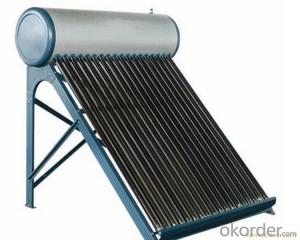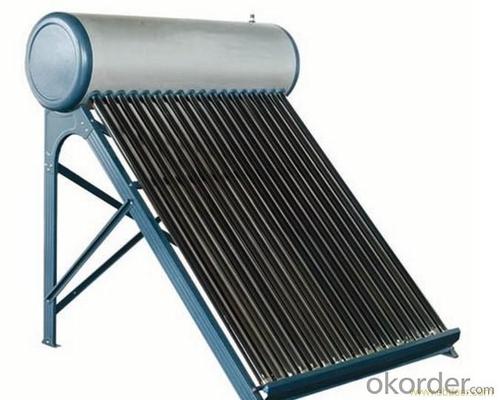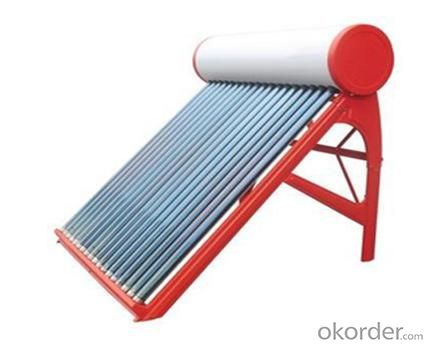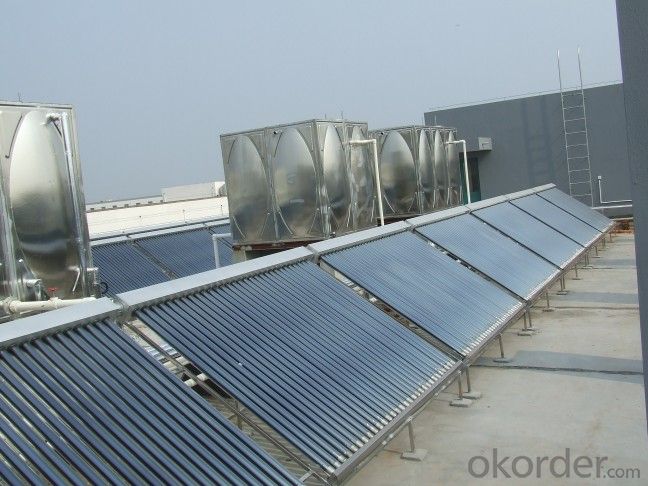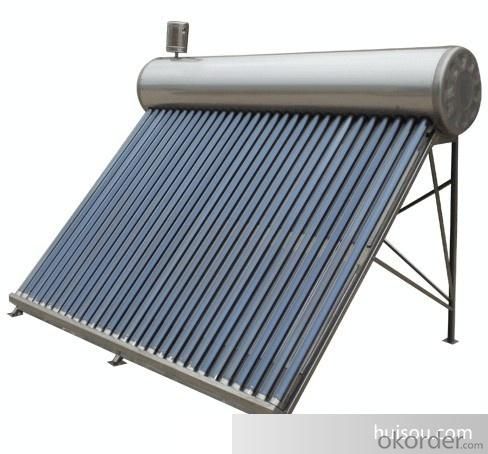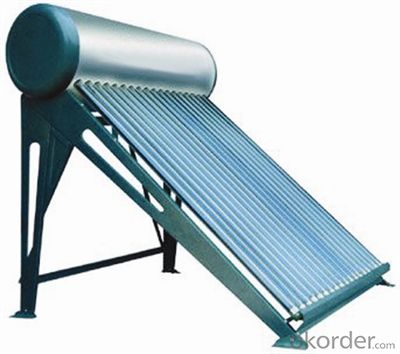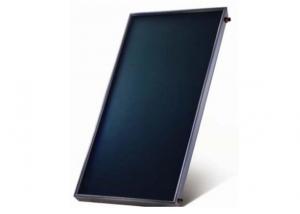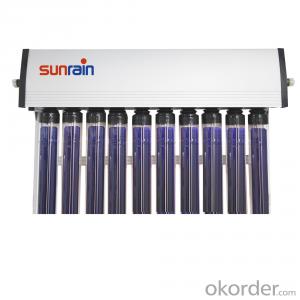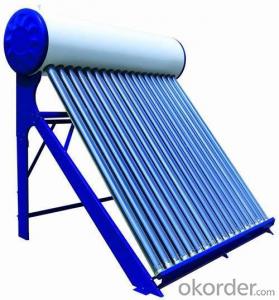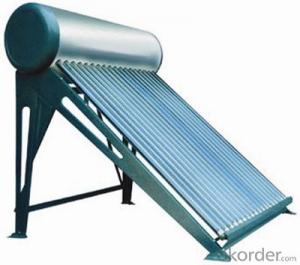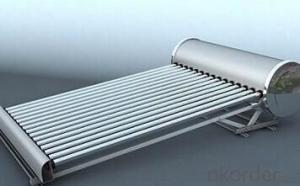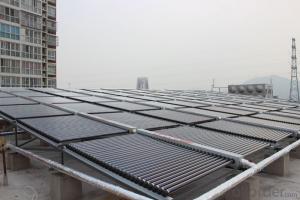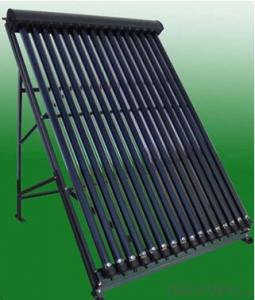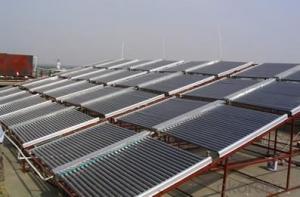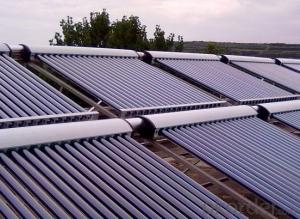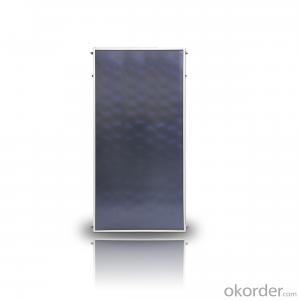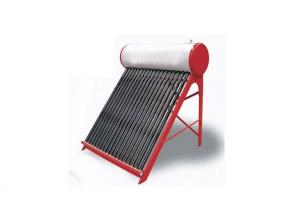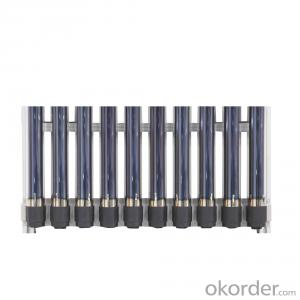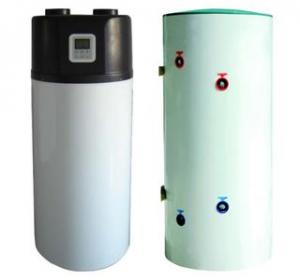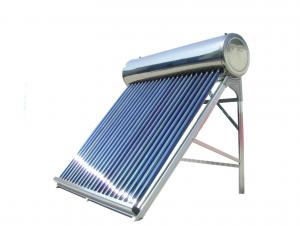150L Stainless Steel Solar Water Heater for Stock Tank
- Loading Port:
- China main port
- Payment Terms:
- TT OR LC
- Min Order Qty:
- 10 set
- Supply Capability:
- 5000 set/month
OKorder Service Pledge
OKorder Financial Service
You Might Also Like
Working Principle of Domestic Solar Water Heaters:
Solar energy, in essence, is an electromagnetic wave, a type of strong optical radiation, which is produced by thermonuclear fusion reaction. The energy of the solar radiation is transmitted through the liught of different wave length. The solar water heater is designed to mainly take in the energy of visible light & near ultra red light through the selective absorbing coating of vacuum tubes.When the water in the solar collector is heated by the solar radiation, its temperature rises. As a result, the water in the solar collector and the water in the tank form natural convection because of density contrast casued by the temperature difference. So the water of the higher temperature is incessantly forced into the insulated solar water tank( As shown in the figure).
Features
<1> Imported SUS304-2B food-level stainless steel,thickness:0.31~0.5mm
<2> Outer tank: High quality stainless steel,thickness:0.31~0.5mm
<3>Insulation: 50~55mm polyurethane foam
<4> Vacuum tube: CU/SS-AL/N red tube
<5> Frame: Stainless steel/Aluminum alloy,thickness:1.2~2mm
<6> Reflector: Stainless steel/Aluminum alloy as option
<7> Available accessories: Feeding tank,solar controller,electric heater, Mag rod,thermostatic mixing valve
Specification
ITEM.NO | SPECIFICATION | EFFECTIVE LIGHT AREA | TANK'S CAPACITY | APPLICATION PEOPLE | CBM | |||
DIAMETER OF WATER TANK | QTY OF TUBE(pcs) | DIAMETER OF TUBE | LENGTH OF TUBE | |||||
Z-NS5810 | 460mm | 10 | 58mm | 1.8m | 1.04 | 100L | 4 | 0.37 |
Z-NS5812 | 460mm | 12 | 58mm | 1.8m | 1.25 | 120L | 4-5 | 0.44 |
Z-NS5815 | 460mm | 15 | 58mm | 1.8m | 1.56 | 150L | 6 | 0.56 |
Z-NS5818 | 460mm | 18 | 58mm | 1.8m | 1.87 | 180L | 7-8 | 0.64 |
Z-NS5820 | 460mm | 20 | 58mm | 1.8m | 2.08 | 200L | 8 | 0.7 |
Z-NS5825 | 460mm | 25 | 58mm | 1.8m | 2.61 | 250L | 10 | 0.89 |
Z-NS5830 | 460mm | 30 | 58mm | 1.8m | 3.13 | 300L | 12 | 1 |
Z-NS5836 | 460mm | 36 | 58mm | 1.8m | 3.75 | 360L | 14-15 | 1.3 |
Z-NS5840 | 460mm | 40 | 58mm | 1.8m | 4.17 | 400L | 16 | 1.4 |
Z-NS5845 | 460mm | 45 | 58mm | 1.8m | 4.69 | 450L | 18 | 1.6 |
Product Details Show:
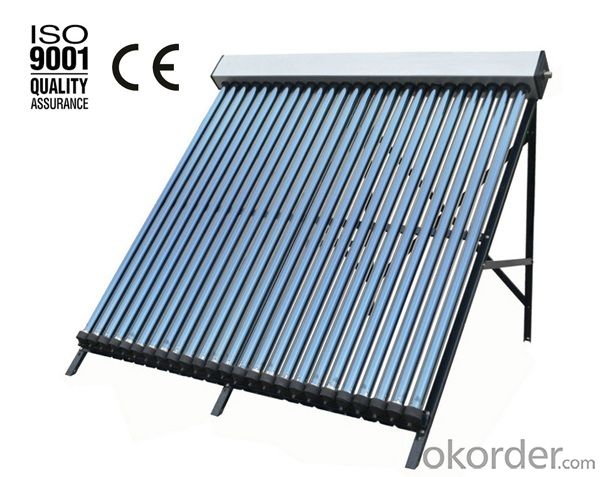
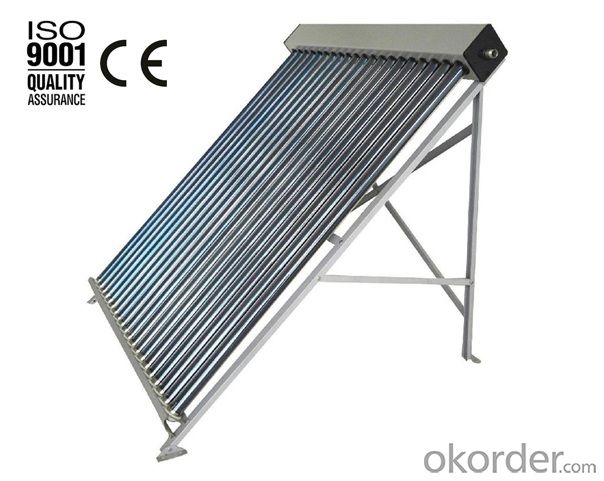
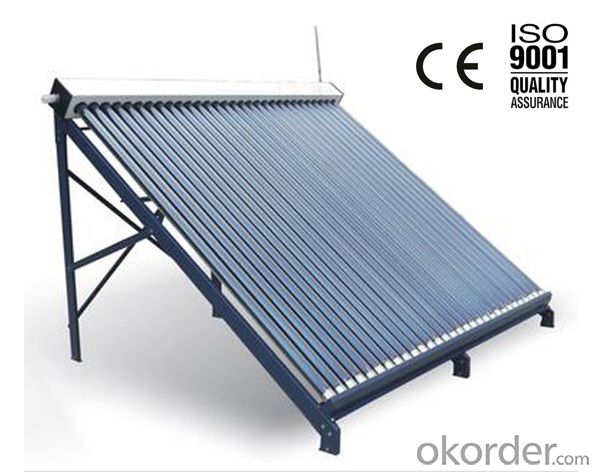
FAQ
1. Q: Are you a factory or trading company?
A: We are a factory. Especially for Solar Controller, PWM solar controller 50A12V/24V
2. Q: Where is your factory located? How can I visit there?
A: Our factory is located in Guangzhou, China. You are warmly welcomed to visit us!
3. Q: what other product you have except such Solar Lighting?
A: We have poly ,mono cells and panels. Off grid solar system, like off grid solar inverter, pure sine wave inverter, solar collector, solar controller, solar charger, Portal solar system, battery, DC Fan, Solar Led Light.
4. Q: Can the price be cheaper?
A: Of course, you will be offered a good discount for big amount.
5. How can I get a sample?
A: Please call us or send email for asking the samples.
- Q: How does the temperature of the incoming water affect the performance of a solar water heater?
- The temperature of the incoming water directly affects the performance of a solar water heater. Higher incoming water temperatures require less energy to heat up to the desired temperature, resulting in increased efficiency and faster heating times. Conversely, colder incoming water temperatures require more energy to reach the desired temperature, reducing the efficiency and slowing down the heating process.
- Q: Can a solar water heater be integrated with a home automation system?
- Yes, a solar water heater can be integrated with a home automation system. By connecting the solar water heater to the home automation system, users can remotely monitor and control the temperature, schedule heating cycles, and receive real-time updates and alerts. This integration allows for increased energy efficiency, convenience, and cost savings by optimizing the usage of solar energy.
- Q: How does a solar water heater impact water conservation efforts?
- A solar water heater positively impacts water conservation efforts by reducing the need for traditional energy-intensive water heating methods. By harnessing the power of the sun, solar water heaters heat water without consuming additional resources, thus minimizing water wastage. This technology helps promote sustainable practices and reduces the overall water consumption in households or businesses, contributing to water conservation efforts.
- Q: Can a solar water heater be used in areas with limited roof space?
- Yes, a solar water heater can be used in areas with limited roof space. There are various types of solar water heaters available, including compact and portable models, which can be installed in smaller spaces such as balconies or yards. Additionally, innovative designs and mounting options allow for installation on walls or in other unconventional areas, making it possible to utilize solar water heating even in areas with limited roof space.
- Q: Can a solar water heater be used in areas with limited hydrogen fuel cell resources?
- In regions where hydrogen fuel cell resources are scarce, a solar water heater can indeed be utilized. By harnessing sunlight, solar water heaters obviate the necessity for hydrogen fuel cells. These systems frequently incorporate solar panels or collectors that capture the sun's energy and transmit it to the water, offering a sustainable and renewable supply of hot water. Consequently, in locales where hydrogen fuel cell resources are limited or non-existent, solar water heaters remain a feasible and eco-friendly choice for water heating.
- Q: What are the components of a solar water heating system?
- The components of a solar water heating system typically include solar collectors, a storage tank, a heat exchanger, a pump, and a controller.
- Q: How much energy can a solar water heater save?
- A solar water heater can save a significant amount of energy, depending on various factors such as the size of the system, location, and usage patterns. On average, a solar water heater can save between 50% to 80% of the energy that would otherwise be consumed by a conventional water heating system.
- Q: What is the impact of system monitoring and control on the performance of a solar water heater?
- System monitoring and control have a significant impact on the performance of a solar water heater. These monitoring and control mechanisms are essential for ensuring the optimal functioning of the system, maximizing efficiency, and extending the lifespan of the equipment. Firstly, system monitoring allows for real-time data collection and analysis. By continuously monitoring various parameters such as temperature, pressure, flow rate, and solar radiation, any anomalies or deviations from the expected values can be quickly identified. This early detection enables prompt corrective actions to be taken, preventing potential system failures or damage. Moreover, monitoring and control systems provide valuable insights into the performance of the solar water heater. By tracking key performance indicators such as energy production, energy consumption, and efficiency, operators can assess the system's overall effectiveness. This information helps in identifying areas of improvement, optimizing the system's performance, and reducing energy losses. In terms of control, these systems enable effective regulation of the solar water heater's operation. By automatically adjusting factors like pump speed, valve positions, or collector angle, the control mechanisms optimize the energy transfer process, ensuring maximum heat absorption from sunlight and efficient heat transfer to the water. This precise control not only enhances the system's performance but also minimizes energy wastage and reduces the reliance on auxiliary heating sources. Furthermore, system monitoring and control play a crucial role in maintenance and troubleshooting. Constant monitoring allows for the detection of any degradation or malfunctioning components. This early identification of issues enables timely maintenance or replacement, preventing potential system downtime and costly repairs. Additionally, control systems can provide alerts or notifications in case of any critical failures, allowing for immediate action to mitigate the impact on the performance of the solar water heater. Overall, system monitoring and control have a profound impact on the performance of a solar water heater. These mechanisms enhance efficiency, improve reliability, and prolong the system's lifespan. By continuously monitoring and controlling various parameters, any deviations can be promptly addressed, optimizing energy transfer and reducing energy losses. Ultimately, this leads to increased energy savings, improved system performance, and a more sustainable and cost-effective use of solar energy.
- Q: Are solar water heaters safe?
- Yes, solar water heaters are safe to use. They are designed with built-in safety features to prevent any potential accidents or hazards. Additionally, they do not produce any harmful emissions or gases, making them environmentally friendly.
- Q: How does the water quality of a solar water heater compare to a traditional water heating system?
- The water quality of a solar water heater is generally comparable to that of a traditional water heating system. Both systems rely on water from the same source, such as a municipal supply or a well. However, solar water heaters have an advantage in terms of reducing mineral and sediment buildup, as they often use a separate storage tank with a heat exchanger. This can help improve the overall water quality by minimizing the accumulation of impurities.
Send your message to us
150L Stainless Steel Solar Water Heater for Stock Tank
- Loading Port:
- China main port
- Payment Terms:
- TT OR LC
- Min Order Qty:
- 10 set
- Supply Capability:
- 5000 set/month
OKorder Service Pledge
OKorder Financial Service
Similar products
Hot products
Hot Searches
Related keywords
